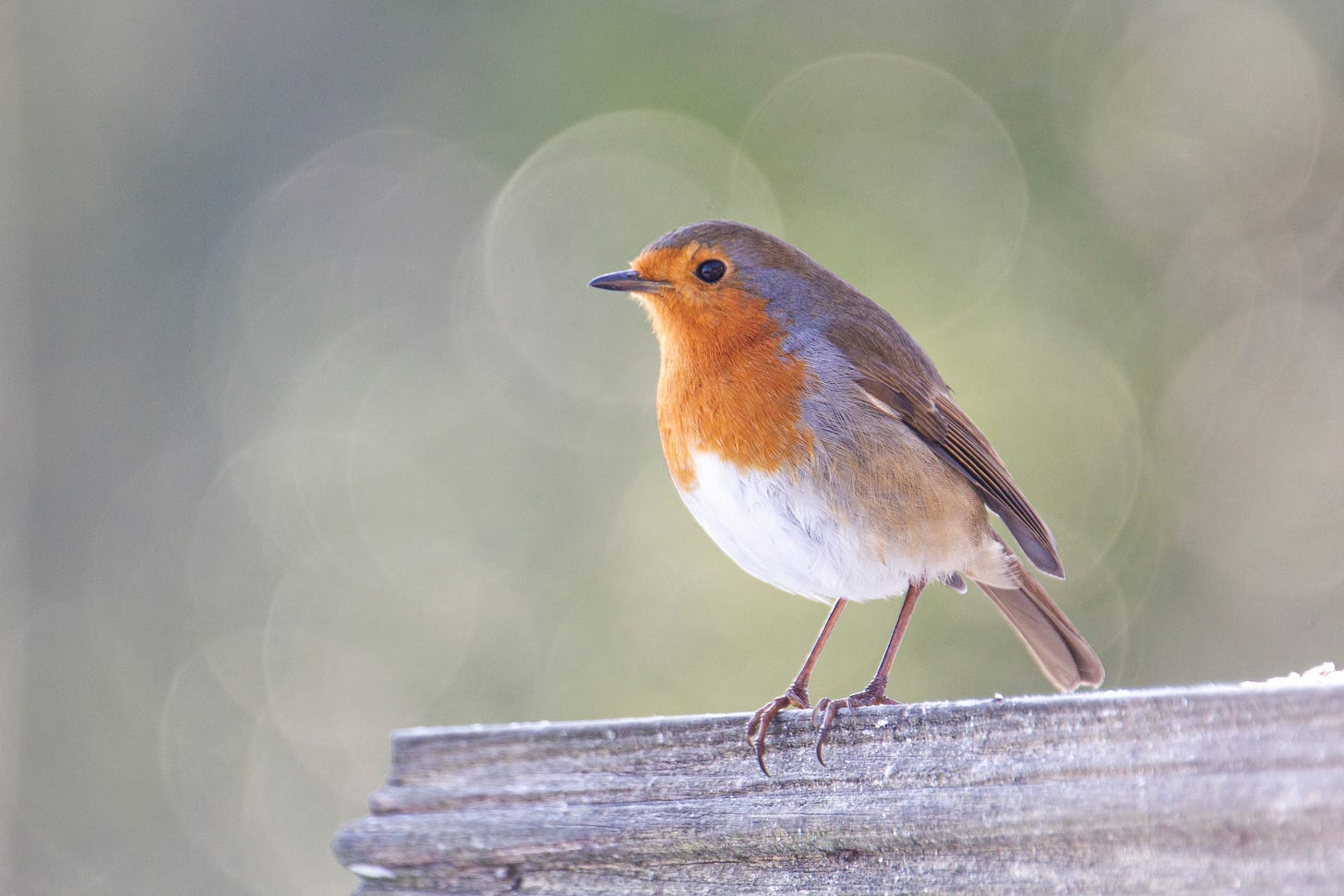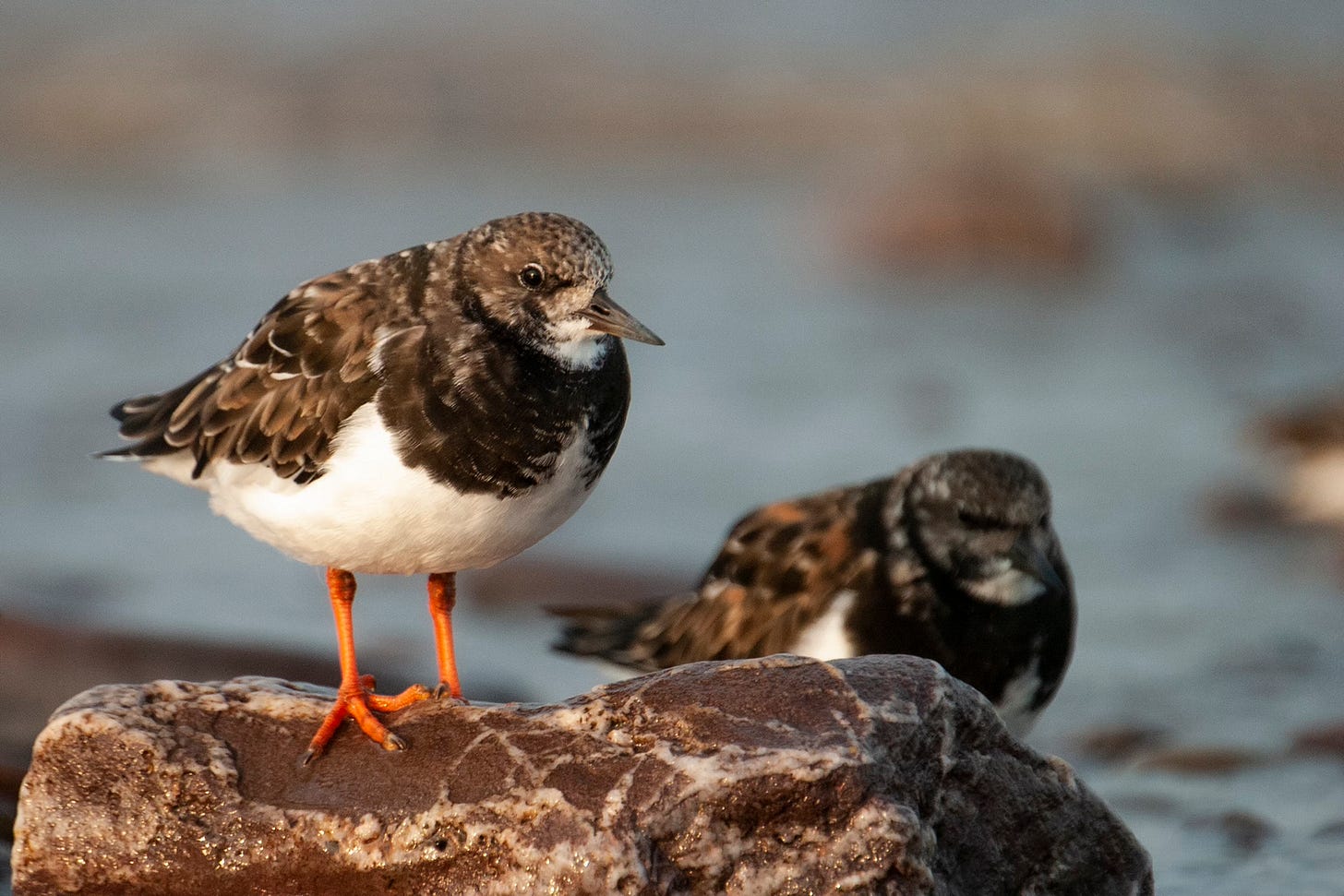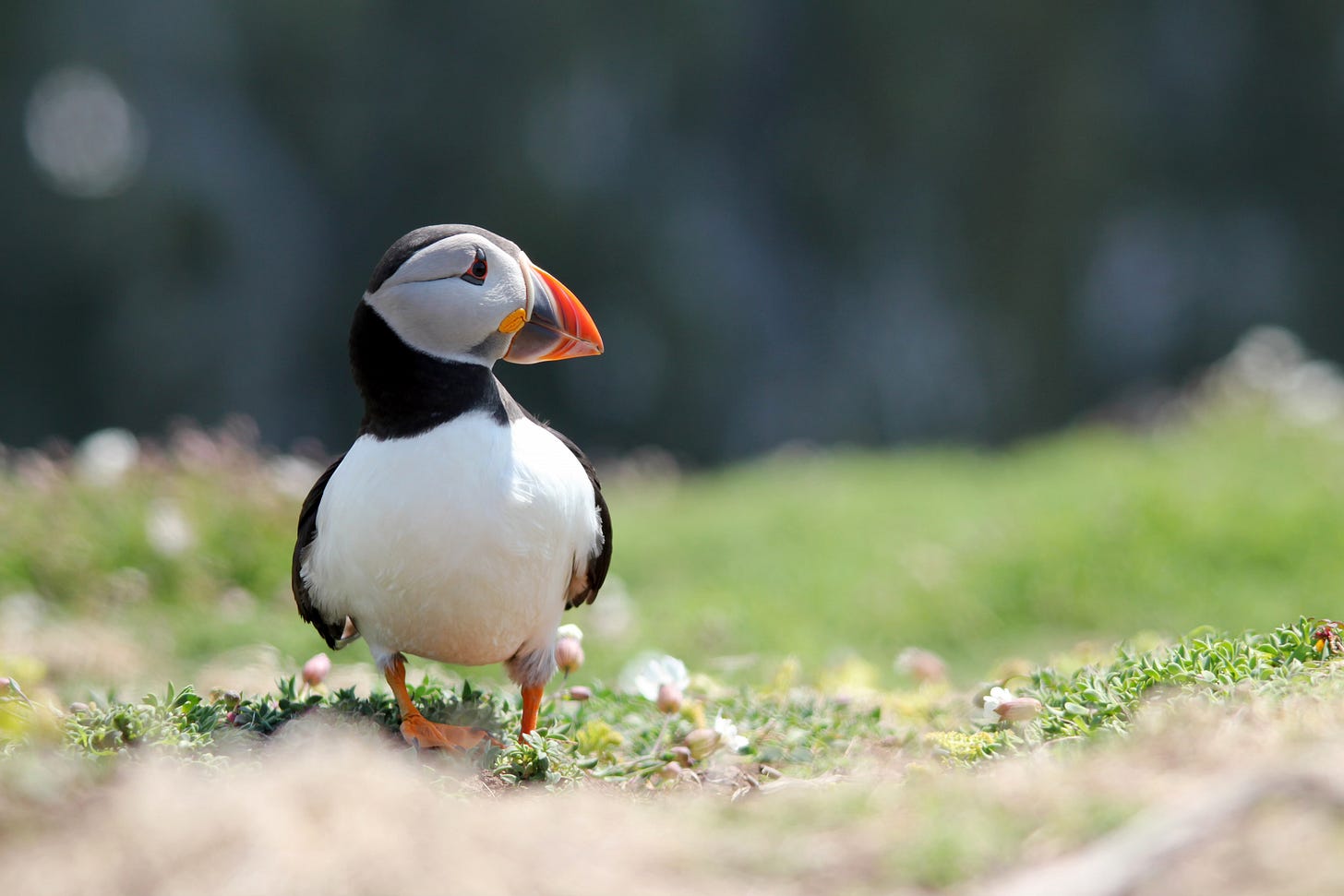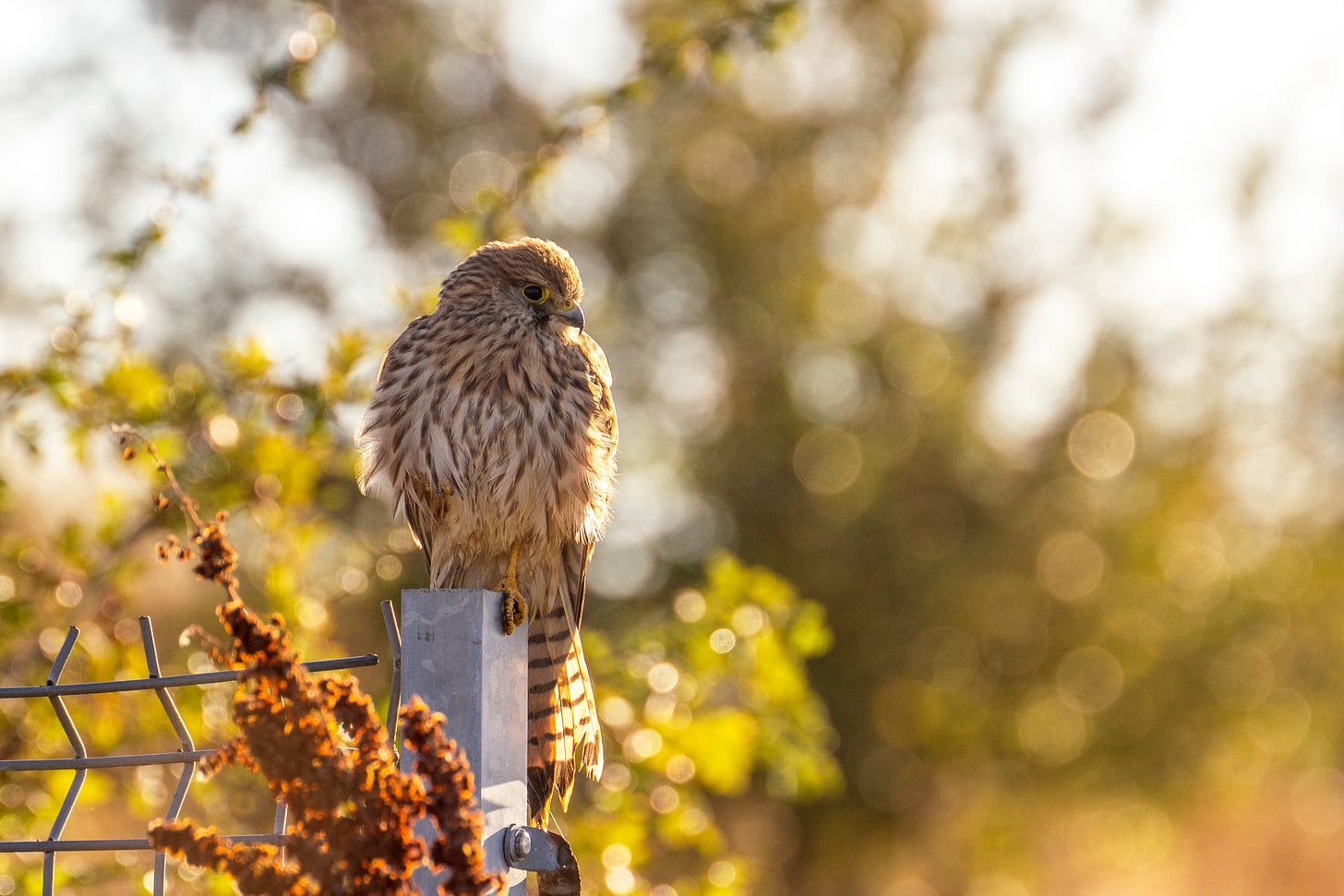A Glimpse of All Things Made New
When a wild creature accepts our presence it is a sacred moment
Few more sacred moments have happened to me than when a little Robin Redbreast fed from my outstretched hand. Moments earlier I had noticed this inquisitive little fellow in a bush singing away and in the hope of getting a good photo, I crouched down to attach my lens to my camera. This robin, though, gave me with something far more precious than a photograph. He gave me a glimpse into the New Creation; the forthcoming time when perfect harmony between mankind and nature is restored. As I was crouched on the ground, the robin flew down and perched himself at my side without a fear in the world. His message was clear: I trust you and I would like some food. I was only too happy to oblige to his bold request.
Every time a wild creature flees from us in fear we ought to feel a tinge of sadness. This is not how things are meant to be. The sparrow and the heron, the hare and the butterfly, should, when they see us, be glad that their good steward has come; the one who has been ordained to help them flourish and to provide them with what they need to fill the earth with their beauty. This is how things once were, in the Garden all those many years ago. This is how the relationship between man and animal is meant to be on God’s very good earth.
But this is no longer so. We all know how distant our present reality is from this idyllic standard. Instead, we find creatures great and small fleeing at the merest sight, or even the faintest whiff, of us. Even the littlest toddler, harmless as we know them to be, is enough to strike fear into the hearts of a flock of birds who instinctively scatter when any child runs playfully towards them. Creation fears us, flees in terror from us, perceives us as a deadly threat. Disharmony and distrust now characterise God’s very good but now fallen earth. A tragedy reigns supreme.
We must accept that the creatures’ fear of us is well grounded. Far from being an irrational fear, this is a fear for their very lives — a fear that keeps them safe from the source of the Curse and the source of their groaning. How many of us have wantonly killed a creature out of spite or fun? To my great shame, I know I have. History is full of examples of our blood lust: bear baiting, cock fighting, and piles upon piles of dead bison and passenger pigeons slaughtered to satisfy our destructive pleasure and nothing else.
Then think of how much easier you and I find it to kill the little fly that has strayed inside our house than to gently guide it safely back outside. A mere inconvenience causes us to arbitrarily destroy a creature God has made, and who is faithfully fulfilling the ecological function that God has ordained for them. Their only sin? Straying inside the home of the one whom they share this earth with. By virtue of being a creature designed and made by God, and one which is causing us no harm, this fly has a right to life. It is just we find them inconvenient or annoying and would rather exterminate them than treat them as a subject of God’s care and our responsible stewardship. We kill something God has made without a second’s thought. What does this say about our attitude towards the Maker?
We kill and we exterminate. We destroy their habitats and greedily grab their resources leaving them with nothing. And yet we wonder why the creatures flee from us in terror. Yes, it is true that subsequent to the Fall, God has put a natural fear of us in their hearts,1 but our selfish, abusive, and destructive actions have only served to justify their fears and have amplified their terror far beyond what is natural. We have been the cause of nature’s terror, not nature’s jubilation; and the cause of its destruction rather than its flourishing. This is how far we have fallen.
Granted, the enmity is not wholly one sided; mankind also has ample reason, at times, to be fearful of nature. Lions kill and snakes bite. Mosquitos inject malaria and fleas dispense a Black Death. Locusts consume a farmer’s field, and blight wipes out a nation’s harvest. Nature has the potential to be a most ardent, fearsome, and deadly foe, which serves to underscore just how vast the rupture between man and beast has become.2 But despite all this, we must not forget that we are responsible for the rupture. It was mankind’s sin that caused the Fall and led to the subjection of creation to the curse; it was our sin that transformed these creatures from being friends to being foes. The blame ultimately stops with us.
But blame always comes with an attached responsibility. A responsibility to rectify the damage and to heal the rupture, where we can. Accepting the blame is the first step towards restoring harmony.
After taking the necessary steps of acknowledging our complicity in the fractured relationship between man and beast and repenting of our destructiveness and selfishness, we must look with compassion upon the fearful creatures that surround us and endeavour to give them little reason to fear us. We should act with kindness and gentleness towards them, exercise restraint in our use of natural resources, and benevolently give back to nature — space, resources, and safety — where we can. Above all we must never unnecessarily scare or kill3 any creature. As Francis Schaeffer says, this extends to stepping over the ant on the pavement as a Christian duty.4
I like to think that the safest person to creation is the one who is the most holy; the one who is relating to their Maker — and what He has made — as he or she should. In the same way that we cannot be said to love our children if we despise and destroy what they have lovingly made us, how can we say we love God, the Creator, if we despise, abuse, and destroy what He has made? The holy person, therefore, loves creation not only for its beauty, but because it is the creation of the One whom they love and who has loved them. He or she remembers that their fellow creatures have been given the command to fill the earth just as much as humans have and that the creatures, too, bring glory to God and reveal something of Him to us. In light of all, this, the holy man or woman delights in striving to act in the same way towards creation than God does — with care, attention, benevolence, and love.
The holy man or woman is also the one who is denying themselves most keenly and is thus imposing only a limited burden on creation through their limited consumptive behaviours and desires. They strive to give back to nature as much as they take and are careful to waste nothing that God has given them. They tread lightly on this earth; their footprint can scarcely be observed.
The greatest need, therefore, for the conservation movement is an increase in holiness. Personal holiness. The mortification of sin: violence, greed, selfishness, bloodlust, wastefulness, destructiveness, and the concomitant pursuit, through the Spirit’s help, of virtues: kindness, attentiveness, self-denial, stewardship, affection, and a deep love for what God has made.
Creation’s need for us to be holy is one of the reasons why I find the stories of the ancient saints and their harmonious, almost brotherly relationship, with the beasts — ranging from usually ferocious lions to naturally timid blackbirds — so heartening. Perhaps these wild creatures glimpsed in these holy men and women how mankind once was in our sinless state before the Fall. In the presence of such holiness, such gentleness, and such kindness, the creatures felt no need to be afraid. Sanctified people are attractive to creation. Indeed, they are who creation is longing to be revealed.
But in His grace and kindness, God does not reserve this special, almost sacred, encounter of the harmony between wild creatures and man only to His most holy ones — or even only to Christians. Each of us can probably look back to a time when a wild creature let us draw in close; and for those of us who delight to be out in Creation, we will be treated to this experience again before long.
When it happens, we ought to realise that we are experiencing one of the greatest privileges and spectacles on earth: I believe the Creator is beckoning us to glimpse the world and His creatures as they should be. It is a glimpse back into Eden, yes, but more accurately, it is a glimpse forward — a glimpse into the New Creation when the lion lies down with the lamb. In this sacred moment where the harmony, for a brief moment, has been restored, our wonder should lead to praise as we worship the God who has gifted us a tiny little glimpse of what the glorious New Creation will be. And seeing, though dimly and in part, the wonder of what is to come, we should long to be a member of that glorious harmony when He returns to make all things new.
Some photographs of creatures that gave me this special moment of harmony
Genesis 9:2. In some regards, this is a blessing, especially for those creatures which can harm us.
In some of these cases, it may be necessary to kill what is causing us harm.
I am not suggesting here that we should all be vegetarians. I am a meat eater myself.
Francis Schaeffer, Pollution and the Death of Man.









I go to extraordinary inconvenience to safely usher all critters out of the house, unless it's a good environment for them. In which case I give them names and tell me cleaner not to harm them.
There's a lot to think about here...